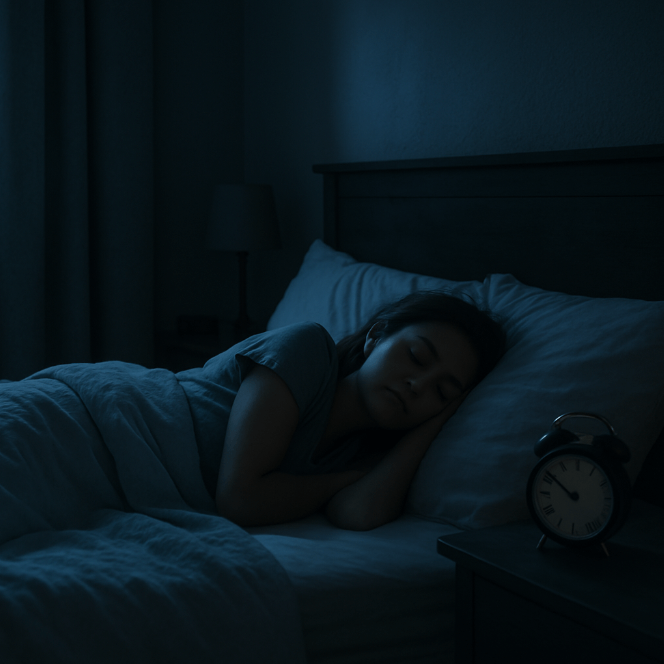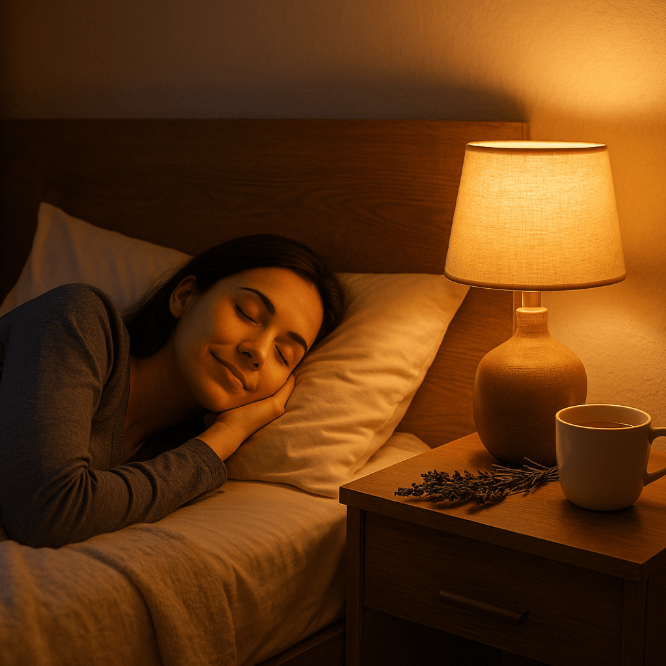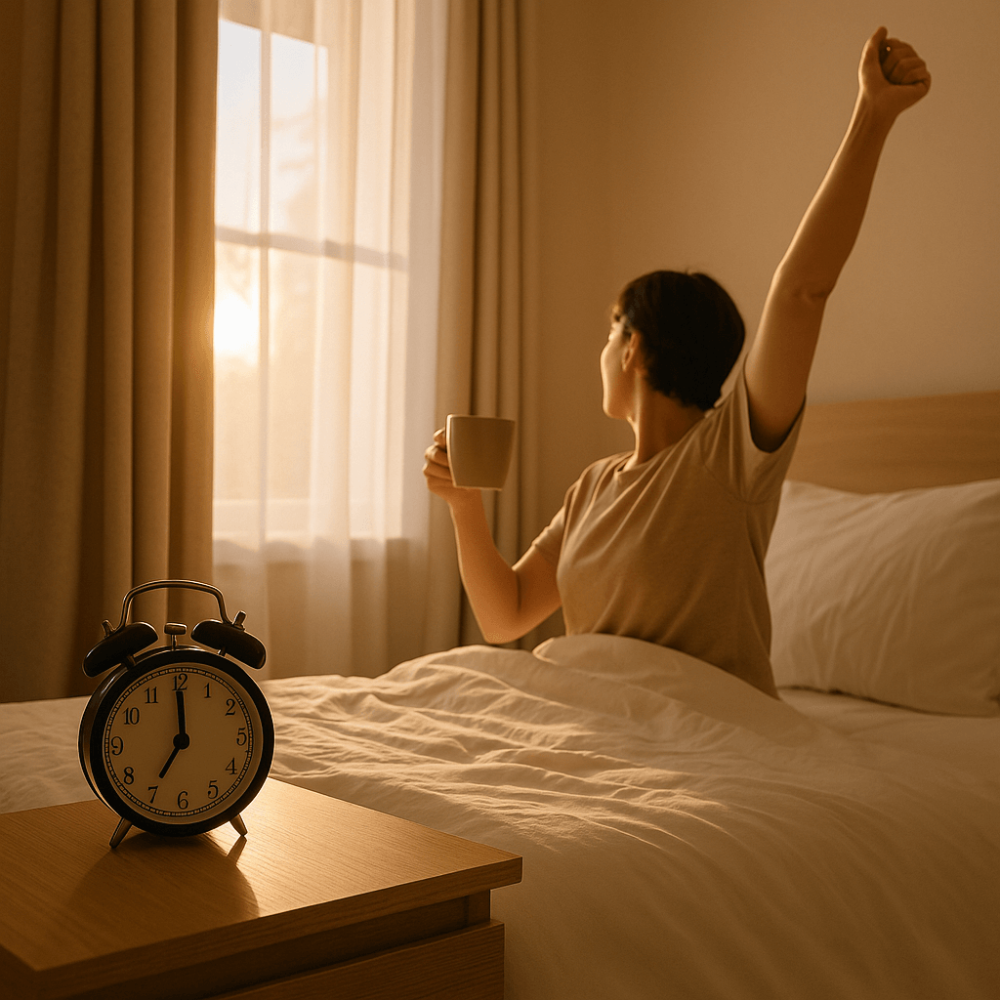You fall asleep just fine… but then 2 a.m. hits. You’re suddenly wide awake, staring at the ceiling, counting the hours until your alarm goes off. Sound familiar?
Waking up in the middle of the night can feel frustrating and disruptive - but the good news? There are simple, science-backed habits that can help you sleep soundly from bedtime to sunrise. Let’s break down why it happens, what it means, and how you can start waking up after the sun—not at 3 a.m.
Why You Might Be Waking Up at Night
It’s normal to stir slightly during sleep cycles - but if you're waking up fully and can’t fall back asleep, something is likely interrupting your rest.
Common culprits include:
- 🔊 Noise – From street sounds to a snoring partner.
- 💡 Light – Light pollution, glowing phones, and bright alarms mess with melatonin.
- 🌡️ Temperature – If you're too hot or too cold, your body wakes up.
- 😵💫 Stress & Anxiety – Racing thoughts love to show up at 2 a.m.
- 🍷 Alcohol – It helps you doze off quickly, but disrupts deep sleep later.
- 📱 Screens – Blue light suppresses your brain’s “sleepy” signals.
- 🔄 Hormonal changes – Especially common for women during menstrual cycles or perimenopause.
What Happens When You Sleep Straight Through
Sleeping through the night allows your body to move naturally through all the important sleep cycles - especially the deeper stages like REM and slow-wave sleep.
💡 Here’s what uninterrupted sleep does for you:
- Boosts energy and mood 😄
- Improves memory and focus 🧠
- Enhances immune function 💪
- Supports hormone balance and metabolism ⚖️
- Reduces stress and inflammation 🧘
It’s not just about clocking 8 hours—it’s about the quality of those hours.
Sleep-Through Strategies That Actually Work
Let’s get into the good stuff. Here are practical habits you can start using tonight:
⏰ Stick to a Consistent Sleep Schedule
Go to bed and wake up at the same time every day—yes, even on weekends. Your internal clock thrives on rhythm. After a few weeks, your body will start feeling sleepy and alert at the right times automatically.
☕ Cut Back on Caffeine and Alcohol
Caffeine can stay in your system for up to 8 hours, and alcohol can interfere with your REM cycle—causing wake-ups in the second half of the night.
Tip: No coffee after 2 p.m., and limit alcohol at least 3 hours before bed.
🛏️ Create a Sleep-Friendly Environment
Turn your bedroom into a sleep sanctuary:
- Use blackout curtains or a 3D Eye Mask
- Try white noise machines or noise-canceling earplugs
- Keep the room cool (around 65–68°F / 18–20°C)
- Remove glowing electronics and reduce clutter
🍽️ Watch What (and When) You Eat
Heavy or spicy meals too close to bedtime can disturb your sleep. Sugar spikes may also lead to middle-of-the-night crashes.
✅ Do this instead: Finish eating at least 2–3 hours before bed. If you need a snack, go for a banana, a handful of almonds, or Greek yogurt.
🧘 Calm Your Mind Before Bed
Stress and anxiety are major sleep disruptors. Ease into rest with:
- A wind-down routine: reading, light yoga, journaling, or listening to calming music
- Breathwork or meditation: even 5 minutes helps
- A warm bath or shower: lowers core body temperature and signals sleepiness
🌙 Power Down With Intention
Start dimming the lights and cutting out screen time 30–60 minutes before bed. That means no doomscrolling, no intense Netflix binges, and no email replies after dark.
Try this instead: a book, warm tea, or simply sitting in quiet.
What to Do If You Wake Up Anyway
Let’s be real - sometimes, you’ll still wake up. And that’s OK.
✅ Do:
- Stay calm. Remind yourself it’s normal.
- Try 4-7-8 breathing: Inhale for 4, hold for 7, exhale for 8.
- Use a soft amber nightlight if you need to get up.
- Journal or stretch briefly if your mind won’t settle.
🚫 Avoid:
- Checking your phone
- Bright lights
- Looking at the clock repeatedly
- Letting stress spiral (“I’ll never fall back asleep!”)
The key? Don’t activate your brain more than you have to.
Conclusion
Sleeping through the night is possible - and it starts with a few intentional habits. With the right environment, routine, and mindset, your body can relearn how to rest deeply, fully, and without interruption.
At Slumberite, we believe better sleep starts with better support—like soothing 3D Eye Masks, Noise-Cancelling Earplugs, and calming bedtime guides that help you unwind with intention. Because when you sleep right, you live better.



Leave a comment
This site is protected by hCaptcha and the hCaptcha Privacy Policy and Terms of Service apply.